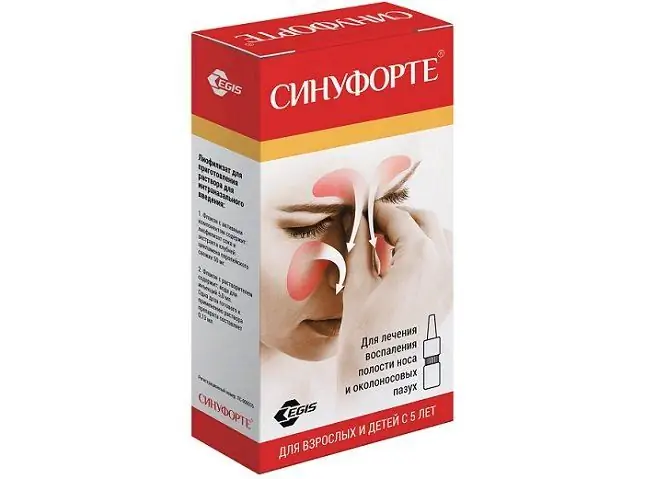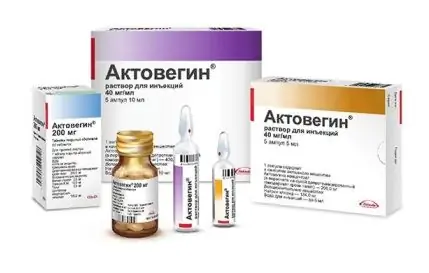- Author Rachel Wainwright wainwright@abchealthonline.com.
- Public 2023-12-15 07:39.
- Last modified 2025-11-02 20:14.
Zimeven
Zimeven: instructions for use and reviews
- 1. Release form and composition
- 2. Pharmacological properties
- 3. Indications for use
- 4. Contraindications
- 5. Method of application and dosage
- 6. Side effects
- 7. Overdose
- 8. Special instructions
- 9. Application during pregnancy and lactation
- 10. Use in childhood
- 11. In case of impaired renal function
- 12. Use in the elderly
- 13. Drug interactions
- 14. Analogs
- 15. Terms and conditions of storage
- 16. Terms of dispensing from pharmacies
- 17. Reviews
- 18. Price in pharmacies
Latin name: Cymevene
ATX code: J05AB06
Active ingredient: ganciclovir (Ganciclovir)
Producer: Par Sterile Products ELS (USA), F. Hoffmann-La Roche Ltd. (Switzerland)
Description and photo update: 2019-09-07
Prices in pharmacies: from 1559 rubles.
Buy

Cymeven is an antiviral drug.
Release form and composition
Dosage forms of Cymeven:
- lyophilisate for the preparation of a solution for infusion: a powdery mass of almost white or white color (500 mg each in 10 ml glass vials, 1 vial in a cardboard box);
- capsules (84 pcs. in a glass bottle of dark color, in a cardboard box 1 bottle).
Each pack also contains instructions for the use of Zimeven.
In 1 vial with lyophilisate, the content of the active ingredient, sodium ganciclovir, is 546 mg, which is equivalent to 500 mg of ganciclovir.
In 1 capsule, the content of ganciclovir is 250 mg.
Pharmacological properties
Pharmacodynamics
Cymeven is an antiviral drug. Its active ingredient is ganciclovir, a synthetic analogue of 2'-deoxyguanosine, which has the property of inhibiting the multiplication of herpes viruses in vitro and in vivo. Ganciclovir is active against herpes simplex viruses type 1 and 2 (Herpes simplex 1 and 2), human cytomegalovirus (CMV), human herpes virus (HHV) type 6, 7 and 8, Epstein-Barr virus (human herpesvirus type 4), hepatitis B virus and chickenpox (Varicella zoster). The results of clinical trials are limited to assessing the effectiveness of the drug only in the treatment of patients infected with cytomegalovirus.
In CMV-infected cells, ganciclovir is phosphorylated by viral protein kinase to form ganciclovir monophosphate. Further, the phosphorylation process continues under the action of several cellular kinases with the formation of ganciclovir triphosphate, which undergoes subsequent intracellular slow metabolism. Phosphorylation of ganciclovir depends to a large extent on the action of viral kinase, so it predominantly occurs in cells infected with human CMV and herpes simplex virus. It was found that ganciclovir disappears from the extracellular fluid within 18 hours, while the period of its intracellular half-life is from 6 to 24 hours.
The mechanism of the viral-static action of ganciclovir is due to its ability to suppress the synthesis of viral DNA (deoxyribonucleic acid). One of the pathways is associated with the competitive inhibition by DNA polymerase of the process of incorporation of deoxyguanosine triphosphate into DNA, the second path is associated with the introduction of ganciclovir triphosphate into viral DNA, which leads to a complete cessation or very limited elongation of viral DNA.
In vitro, it was found that to achieve an inhibitory antiviral effect against CMV, equal to 50% of the maximum IC 50 (concentration of half-maximal inhibition), a level of the minimum concentration of the drug in the blood, ranging from 0.04 μg / ml (0, 14 μM) to 3.5 μg / ml (14 μM).
In rare cases, approximately 1% of patients develop CMV resistance to ganciclovir. In vitro CMV resistance to ganciclovir is formed on the following definition - median IC 50exceeds 1.5 μg / ml (6 μM). With cytomegalovirus retinitis and AIDS (acquired immunodeficiency syndrome), resistance was observed in patients who had never received ganciclovir. During the first 6 months of using Cymeven in the form of a lyophilisate or capsules for the treatment of CMV retinitis, virus resistance appeared in 3-8% of patients. In addition, viral resistance was observed in patients with long-term treatment with CMV retinitis by infusion. CMV resistance to ganciclovir is mainly characterized by a decrease in the ability to form active triphosphate. In some cases, resistant viruses appear that contain mutations in the UL97 CMV gene, which is responsible for phosphorylation of ganciclovir. There are viruses with a mutation in the viral DNA polymerase gene, which determine resistance to both ganciclovir and other drugs,acting on the CMV.
Pharmacokinetics
After the infusion of ganciclovir to patients infected with HIV (human immunodeficiency virus) and CMV, or adults with AIDS at a dose of 5 mg / kg (5 mg per 1 kg of body weight) for 1 hour, AUC 0-24 (total area under the curve "concentration - time ") ranges from 0.018 3 to 0.032 06 mg x hour / ml. The maximum concentration (C max) of ganciclovir in plasma is reached within 1 hour and ranges from 0.004 38 to 0.010 45 mg / ml.
After oral administration, ganciclovir is absorbed from the gastrointestinal tract to a small extent, its bioavailability is 6-9%. C max in blood plasma is reached after 1.8 hours.
Plasma protein binding is 1-2%.
After intravenous (i / v) administration, V d (volume of distribution) of ganciclovir correlates with body weight, when the equilibrium concentration is reached, it can be from 0.5 to 0.8 l / kg. After taking capsules, Vd is 0.74 l / kg.
Ganciclovir crosses the placenta and is distributed in all tissues. In the cerebrospinal fluid, its concentration 0.25-5.67 hours after intravenous administration at a dose of 2.5 mg / kg is 0.000 5-0.000 68 mg / ml, which corresponds to 24-67% of the concentration in blood plasma.
When administered intravenously at doses from 1.6 to 5 mg / kg, the kinetics of ganciclovir is linear.
The half-life (T 1/2) after intravenous administration ranges from 1.44 to 5.76 hours, after oral administration - from 3.1 to 5.5 hours.
By glomerular filtration and tubular secretion through the kidneys, the main part of the administered (parenteral and oral) drug is excreted unchanged. With normal renal function after intravenous administration, 84.6 to 94.6% of the dose of ganciclovir is found in the urine unchanged, systemic clearance is in the range from 2.26 to 7.31 ml / min per 1 kg of body weight, renal clearance - from 1.88 to 4.16 ml / min per 1 kg of body weight, this corresponds to 90-100% of the dose of ganciclovir.
It should be borne in mind that after intravenous and oral administration of ganciclovir at doses from 1.25 to 5 mg / kg body weight during a hemodialysis session, its concentration in blood plasma decreases by about 50%. Against the background of an intermittent hemodialysis scheme, the fraction of removed ganciclovir is from 50 to 63%, the clearance of the active substance is from 42 to 92 ml / min. With continuous dialysis, the clearance is lower and ranges from 4 to 29.6 ml / min, but before the next dose of the drug is taken, a larger percentage of the dose taken is excreted from the body. T 1/2 of the drug during dialysis is 3.3-4.5 hours.
There are no results of studies of the pharmacokinetics of ganciclovir in patients over the age of 65 years.
Indications for use
The use of Cymeven is indicated for the treatment of life-threatening or vision-threatening CMV infection in persons with immunodeficiencies, including AIDS.
The drug is also prescribed for the prevention of manifest CMV infection after surgery for organ transplantation.
In addition, Cymeven capsules are used to treat acute superficial keratitis caused by the herpes simplex virus.
Contraindications
For both dosage forms:
- thrombocytopenia - the number of platelets in the blood is less than 25,000 units in 1 μl;
- neutropenia - the absolute number of neutrophils is less than 500 units in 1 μl;
- period of breastfeeding;
- hypersensitivity to valganciclovir, acyclovir or drug components.
The appointment of Cymeven during pregnancy is undesirable and should be avoided, except in cases of urgent need, when, in the opinion of the doctor, the potential effect of therapy for the mother outweighs the possible threat to the fetus.
In addition, each dosage form has additional contraindications.
Lyophilisate
- the level of hemoglobin in the blood is less than 8 g / dl;
- age up to 12 years.
Caution should be given to intravenous administration of ganciclovir in elderly patients with renal failure.
Capsules
- severe renal dysfunction;
- congenital and neonatal CMV infection;
- use in ophthalmology for the treatment of children under 12 years of age.
Tsimeven, instructions for use: method and dosage
Lyophilisate
Cymeven in the form of a lyophilisate is intended for the preparation of a solution for infusion.
To prepare the solution, the use of bacteriostatic water for injection is contraindicated, containing parabens (parahydroxybenzoates) incompatible with sterile powder of ganciclovir, which can lead to precipitation.
To dissolve the lyophilized powder, 10 ml of sterile water for injection should be introduced into the vial. Shake the bottle slightly, and then make sure that there are no powder residues or mechanical impurities in the resulting solution. The concentration of ganciclovir in the finished solution in the vial is 50 mg / ml.
After preparation, the solution in the vial remains stable at room temperature for 12 hours, it cannot be stored in the refrigerator!
The dose of Cymeven is determined individually by calculation, taking into account the patient's body weight.
To prepare the infusion solution, the required dose is taken from the vial and added to the amount of the base infusion solution required to obtain a solution with a concentration of not more than 10 mg / ml. For infusion, you can use 0.9% sodium chloride solution, Ringer's or Ringer's lactate solution, 5% aqueous dextrose solution.
Do not mix Cymeven with other drugs!
The infusion solution should be used no later than within the next 24 hours after preparation. If necessary, the infusion solution should be stored in the refrigerator and not allowed to freeze.
Ganciclovir is a potential carcinogen and mutagen for humans, therefore, inhalation of ganciclovir, as well as direct contact of the lyophilized powder or ready-made solution with the skin and mucous membranes of the body, should not be allowed. If ganciclovir comes into contact with the skin, this area of the body should be immediately washed thoroughly with soap and water. If the drug gets into the eyes, rinse them with clean water.
The ganciclovir solution should not be injected by jet or IV quickly!
It should be borne in mind that excessive (clinically unjustified) plasma concentration of ganciclovir may increase its toxicity. Intramuscular or subcutaneous injections of Zimeven can cause severe irritation of tissues, since the acidity of the solution is about 11. Do not change the mode of administration, infusion rate or exceed the recommended dose!
Duration of intravenous infusion - 1 hour.
Recommended standard dosage of Zimeven:
- treatment of CMV retinitis: initial therapy - 5 mg / kg 2 times a day. Observing the same interval between procedures, they should be carried out within 14-21 days. For patients with normal renal function, the daily dose should be no more than 10 mg / kg. Maintenance therapy - 5 mg / kg 1 time per day daily for 7 days a week or 6 mg / kg 1 time per day daily for 5 days a week, followed by a break of 2 days;
- Prevention of overt CMV infection in patients after transplantation: initial therapy for patients with normal renal function - 5 mg / kg 2 times a day, observing the same interval between infusions. The duration of the course is 7-14 days. Supportive therapy - 5 mg / kg 1 time per day daily for 7 days a week or 6 mg / kg 1 time per day every day for 5 days a week, followed by a break of 2 days.
In renal insufficiency, the dose of Cymeven is adjusted taking into account creatinine clearance (CC).
To calculate CC in men, it is necessary to subtract the patient's age (in years) from 140. The result obtained is multiplied by the body weight (in kg), divided by 72 and multiplied by 0.011, and then by the patient's serum creatinine concentration (μmol / l).
To determine the QC in women, the same calculation sequence is used, only the result obtained should be additionally multiplied by 0.85.
The recommended dosage of Cymeven for patients with renal insufficiency, taking into account CC:
- CC more than 70 ml / min: initial dose - 5 mg / kg 2 times a day; maintenance dose - 5 mg / kg once a day;
- CC 50-69 ml / min: initial dose - 2.5 mg / kg 2 times a day; maintenance dose - 2.5 mg / kg once a day;
- CC 25-49 ml / min: initial dose - 2.5 mg / kg once a day; maintenance dose - 1.25 mg / kg once a day;
- CC 10-24 ml / min: initial dose - 1.25 mg / kg once a day; maintenance dose - 0.625 mg / kg once a day;
- CC less than 10 ml / min: initial dose - after hemodialysis session at 1.25 mg / kg 1 time in 2 days; maintenance dose - 0.625 mg / kg 1 time in 2 days (or 3 times in 7 days).
Treatment of patients with renal insufficiency should be accompanied by careful monitoring of serum creatinine or CC.
Treatment of elderly and senile patients should be prescribed in strict accordance with the state of renal function.
The efficacy and safety of the use of ganciclovir for the treatment of children over the age of 12 years, including patients with congenital and neonatal CMV infection, has not been established. Therefore, when prescribing Cymeven, special care should be taken, comparing the benefits of therapy and the possible risk associated with the likelihood of long-term carcinogenicity and toxic effects on the reproductive system.
Capsules
Cymeven capsules are taken orally.
The doctor prescribes the dose and duration of treatment individually, taking into account the therapy regimen.
Recommended dosage: 1000 mg 3 times a day or 500 mg 6 times a day.
Side effects
In the course of clinical trials in the treatment of overt CMV infection in people with HIV infection who received ganciclovir as an intravenous infusion, the following side effects were recorded (often 2% or more; sometimes less than 2%):
- from the lymphatic system and the hematopoietic system: often - anemia, neutropenia, leukopenia, thrombocytopenia, lymphadenopathy; sometimes - aplastic anemia, eosinophilia, myelosuppression, potentially life-threatening bleeding (caused by thrombocytopenia), episodes of local and systemic infections (caused by suppression of the bone marrow and the immune system), sepsis;
- from the central and peripheral nervous system: often - anxiety, hypesthesia; sometimes - agitation, hallucinations, drowsiness, nightmares, migraine, psychosis, euphoria, thought disorder, ataxia, nervousness, convulsions, coma;
- from the senses: sometimes - hearing loss, pain in the eyeball, visual impairment, retinal detachment, destruction of the vitreous body, glaucoma, blindness;
- from the respiratory system: congestion in the paranasal sinuses, cough, cough with phlegm, pneumocystis pneumonia;
- from the digestive system: often - abdominal pain, diarrhea, esophageal candidiasis, dysphagia; sometimes - dry mouth, belching, ulcerative stomatitis, fecal incontinence, gastrointestinal bleeding, pancreatitis, glossitis;
- from the genitourinary system: sometimes - frequent urination;
- on the part of the cardiovascular system: sometimes - arrhythmia (including ventricular arrhythmia), deep vein thrombophlebitis, phlebitis;
- from the musculoskeletal system: often - arthralgia; sometimes myasthenic syndrome;
- dermatological reactions: often - itchy skin; sometimes - urticaria, dermatitis, acne, herpes simplex, alopecia;
- laboratory parameters: often - hypercreatininemia, increased blood alkaline phosphatase activity; sometimes - hypoglycemia, an increase in the activity of creatine phosphokinase and lactate dehydrogenase in the blood;
- local reactions: often - inflammation at the injection site, infections at the injection site, sepsis (including secondary sepsis); sometimes - pain at the injection site, thrombosis and / or abscess at the injection site, edema and / or hemorrhage at the injection site;
- others: often - infection caused by the Mycobacterium avium complex, fever, candidiasis, bacteremia, pains of various localization (including chest pain), anorexia; sometimes - weakness, malaise, cachexia, dehydration, photosensitivity reactions.
In clinical trials, the following adverse events have been reported with the use of a lyophilisate for the prevention and treatment of overt CMV infection after bone marrow transplantation:
- from the central and peripheral nervous system: confusion, headache, tremor;
- on the part of the cardiovascular system: lowering of blood pressure (BP), tachycardia;
- from the digestive system: bloating, nausea, dyspepsia, diarrhea;
- from the urinary system: hematuria;
- from the hematopoietic system: leukopenia, pancytopenia;
- from the respiratory system: shortness of breath, rhinitis;
- from the senses: bleeding in the eye;
- from the musculoskeletal system: myalgia;
- dermatological reactions: exfoliative dermatitis;
- laboratory parameters: an increase in the activity of hepatic transaminases, an increase in the concentration of creatinine, hypomagnesemia, hypokalemia, hypocalcemia;
- others: fever, tremors, mucosal lesions, facial edema, sepsis, anorexia.
In clinical trials with intravenous ganciclovir for the prevention and treatment of overt CMV infection after heart transplant, the following adverse reactions were noted (very often 12-20%; often 5-9%):
- from the central and peripheral nervous system: very often - headache; often - confusion, peripheral neuropathy;
- on the part of the cardiovascular system: very often - increased blood pressure;
- from the genitourinary system: very often - deterioration of renal function, renal failure;
- from the side of metabolism and nutrition: often - edema;
- from the respiratory system: often - pleural effusion;
- others: very often - infections.
In addition, with the post-registration use of Cymeven in HIV-infected patients and patients after transplantation, there are reports of such side effects as the development of anaphylaxis and decreased fertility in men.
Oral administration of ganciclovir in HIV-infected patients and patients after organ transplantation revealed the following side effects:
- from the central and peripheral nervous system: dizziness, insomnia, depression;
- on the part of the cardiovascular system: vasodilation (reddening of the skin of the face, lowering blood pressure);
- from the digestive system: flatulence, constipation, cholangitis, vomiting, cholestatic jaundice;
- from the lymphatic system and the hematopoietic system: leukocytosis;
- on the part of metabolism and nutrition: decrease in body weight, diabetes mellitus, hypoproteinemia, hyponatremia;
- from the senses: taste disturbances, amblyopia;
- dermatological reactions: increased sweating;
- others: general malaise, bleeding, ascites, asthenia, infections (bacterial, viral, fungal).
Overdose
Symptoms: abdominal pain, vomiting, diarrhea, hematological toxicity in the form of leukopenia, neutropenia, pancytopenia, myelosuppression, bone marrow aplasia, granulocytopenia, signs of neurotoxicity (generalized tremor, convulsions), hepatotoxicity (liver dysfunction, hepatitis () and nephrotoxicity renal failure, increased creatinine concentration). In patients with pre-existing renal lesions, hematuria may increase.
Treatment: in case of an overdose of the drug Cymeven, the use of hemodialysis and hydration is indicated. Hematopoietic growth factors are recommended for the treatment of severe leukopenia, anemia, thrombocytopenia and / or neutropenia.
special instructions
Treatment with Zimeven is recommended to be accompanied by monitoring the number of blood cells, including the number of platelets. With the development of a severe form of leukopenia, neutropenia, anemia and / or thrombocytopenia, concomitant therapy with hematopoietic growth factors and / or temporary discontinuation of the drug is necessary.
Influence on the ability to drive vehicles and complex mechanisms
Patients who develop drowsiness, dizziness, seizures, ataxia and / or confusion during ganciclovir therapy should avoid performing potentially hazardous activities, including driving and working with complex mechanisms.
Application during pregnancy and lactation
The appointment of Zimeven during gestation should be avoided. The use of the drug is allowed only in cases where the potential benefit of therapy for the mother is undoubtedly higher than the possible threat to the fetus.
It is contraindicated to use the drug during lactation. If necessary, taking Cymeven during this period, breastfeeding should be discontinued.
The potential teratogenic and carcinogenic effects of Cymeven can cause congenital malformations and malignant neoplasms. Therefore, during the period of treatment, women of childbearing age need to use reliable contraception.
Men should use a barrier method of contraception both during treatment and for at least three months after it ends. Consideration should be given to the possible temporary or permanent inhibition of spermatogenesis.
Pediatric use
The appointment of Cymeven in the form of capsules for the treatment of ophthalmic diseases and intravenous administration to children under the age of 12 is contraindicated.
With impaired renal function
With caution, Cymeven should be prescribed for intravenous administration to patients with renal insufficiency.
The use of capsules is contraindicated in case of severe renal dysfunction
When prescribing a dose, it is necessary to take into account the individual CC, and in the course of treatment, carefully monitor the content of creatinine in the blood serum or the CC indicator.
Use in the elderly
With caution, given the state of renal function, it is recommended to prescribe Cymeven to elderly patients.
Drug interactions
- didanosine: in the presence of ganciclovir, the level of didanosine concentration in the blood plasma increases steadily, therefore, careful monitoring of didanosine toxicity is required. At the same time, the concentration of ganciclovir does not undergo clinically significant changes;
- imipenem, cilastatin: promote the development of generalized seizures. The combination with imipenem or cilastatin should be used only after assessing the intended benefit of treatment and the potential risk of side effects;
- mycophenolate mofetil: a slight increase in the concentration of mycophenolic acid phenolic glucuronide and ganciclovir is possible, which does not require dose adjustment. Careful observation is required in combination therapy in patients with impaired renal function;
- zidovudine: increases the risk of neutropenia and anemia;
- dapsone, pentamidine, flucytosine, adriamycin, amphotericin B, vincristine, vinblastine, nucleoside analogs, hydroxycarbamide and other drugs with myelosuppressive action or impairing renal function: a clinically significant increase in their toxicity and toxicity of ganciclovir is possible, therefore, combined administration is possible only in those cases when the potential threat of side effects is significantly inferior to the expected therapeutic effect.
Analogs
The analogue of Cymeven is Ganciclovir.
Terms and conditions of storage
Keep out of the reach of children.
Store at temperatures up to 30 ° C.
The shelf life is 3 years.
Terms of dispensing from pharmacies
Dispensed by prescription.
Reviews of Zimeven
Reviews of Zimeven, in which patients or specialists raise the issue of the effectiveness of the drug, are absent in social networks.
Price for Zimeven in pharmacies
The price of Zimeven for a package containing 1 bottle of lyophilisate can range from 1,673 rubles.
Zimeven: prices in online pharmacies
|
Drug name Price Pharmacy |
|
Cymeven 500 mg lyophilisate for preparation of solution for infusion 10 ml 1 pc. 1559 RUB Buy |

Maria Kulkes Medical journalist About the author
Education: First Moscow State Medical University named after I. M. Sechenov, specialty "General Medicine".
Information about the drug is generalized, provided for informational purposes only and does not replace the official instructions. Self-medication is hazardous to health!






